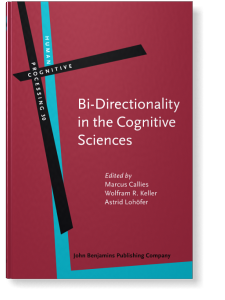Bi-Directionality in the Cognitive Sciences
Avenues, challenges, and limitations
Editors
Cognitive science is the interdisciplinary study of the human mind. As far as the exact relationship between the cognitive sciences and other fields is concerned, however, it appears that interdisciplinary exchange often remains unrealized, possibly because of the uni-directional application of theories, concepts, and methods, which impedes the productive transfer of knowledge in both directions. In the course of the ‘cognitive turn’ in the humanities and social sciences, many disciplines have selectively borrowed ideas from ‘core cognitive sciences’ like psychology and artificial intelligence. The day-to-day practice of interdisciplinarity thus thrives on one-directional borrowings. Focusing on cognitive approaches in linguistics and literary studies, this volume explores bi-directionality, a genuine transdisciplinary interchange in which both disciplines are borrowing and lending. The contributions take different perspectives on bi-directionality: some extend uni-directional borrowing practices and point to avenues and crossroads, while others critically discuss obstacles, challenges, and limitations to bi-directional transfer.
[Human Cognitive Processing, 30] 2011. viii, 313 pp.
Publishing status: Available
© John Benjamins Publishing Company
Table of Contents
-
Editors and contributors | pp. vii–viii
-
Introduction. Bi-directionality: Avenues, challenges, and limitationsMarcus Callies, Wolfram R. Keller and Astrid Lohöfer | pp. 1–18
-
I. Avenues for bi-directionality
-
Genre between the humanities and the sciencesGerard J. Steen | pp. 21–42
-
Culture-specific concepts of emotionality and rationalitySusanne Niemeier | pp. 43–56
-
Widening the goalposts of cognitive metaphor researchMarcus Callies | pp. 57–82
-
How novels feel: Emotional and rational reading processes in contemporary fictionWolfram R. Keller, Astrid Lohöfer and Christine Ott | pp. 83–100
-
Cognitive poetics and the negotiation of knowledgeStephan Freissmann | pp. 101–120
-
WRITING is medicine: Blending cognitive and corpus stylisticsBeatrix Busse | pp. 121–156
-
II. Challenges to and limitations on bi-directionality
-
Collective aesthetics and the Mere Exposure EffectAlexandra Kleeman | pp. 159–170
-
Embodied mind and cross-cultural narrative patternsYehong Zhang | pp. 171–180
-
The mind and the text / the mind in the textDirk Vanderbeke | pp. 181–194
-
Verbal irony in Shakespeare’s dramatic worksWolfgang G. Müller | pp. 195–210
-
Invisible, visible, grammaticalizationLiane Stroebel | pp. 211–234
-
How does the mind do literary work?Gary Thoms and Stefano Versace | pp. 235–248
-
Cognitive science meets language pedagogyAlexander Ziem | pp. 249–278
-
The conceptualization of personality: Converging and diverging evidenceJuliana Goschler | pp. 279–294
-
Cognitive linguistics as a cognitive scienceAnatol Stefanowitsch | pp. 295–310
-
Index | pp. 311–314
“Insgesamt zeugen die Beiträge von einer guten Entwicklung der Kognitiven Poetik, das Themenspektrum und die Vielfalt der Methoden in sozialwissenschaftliche und korpuslinguistische Richtungen zu erweitern. In dieser Hinsicht führt Bi-Direktionalität tatsächlich zu einer Bereicherung der kognitiven Sprach- und Literaturwissenschaften.”
Prof. Dr. Ralph Müller, Universität Freiburg, in Journal of Literary Theory 2012-06-26
Cited by (3)
Cited by three other publications
Pérez-Hernández, Lorena
Freeman, Margaret H.
This list is based on CrossRef data as of 18 july 2024. Please note that it may not be complete. Sources presented here have been supplied by the respective publishers. Any errors therein should be reported to them.
Subjects
Psychology
Main BIC Subject
JMR: Cognition & cognitive psychology
Main BISAC Subject
PSY008000: PSYCHOLOGY / Cognitive Psychology & Cognition
